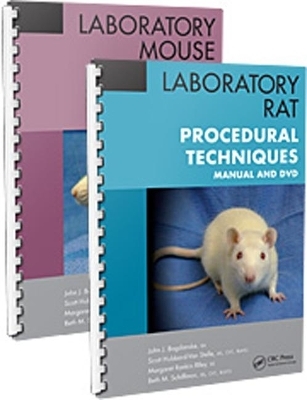
Laboratory Mouse and Laboratory Rat Procedural Techniques
Crc Press Inc
978-1-4398-5050-3 (ISBN)
- Titel z.Zt. nicht lieferbar
- Versandkostenfrei innerhalb Deutschlands
- Auch auf Rechnung
- Verfügbarkeit in der Filiale vor Ort prüfen
- Artikel merken
The resulting DVDs and supporting manuals are complete training resources and refreshers for lab animal veterinarians, veterinary technicians, animal care staff, trainers, and researchers working with mice and rats.
Each DVD Provides:
Narrated video clips that demonstrate and describe each procedural technique
Easy navigation to desired techniques, including handling/transfer, oral gavage, blood draw, restraint, injection, and ear notching and tagging
Each Manual Includes:
Full text narratives and procedural handouts with full-color illustrations of each technique included on the DVD—including purpose and application of the procedure, recommended skills, and necessary supplies
Supplementary chapters that provide normative data for the laboratory rat and mouse
Buy the set and save! Two Manuals and Two DVDs
Also available as individual volumes:
Laboratory Mouse Procedural Techniques: Manual and DVD
Catalog no. K12294, November 2010, ISBN: 978-1-4398-5042-8
Laboratory Rat Procedural Techniques: Manual and DVD
Catalog no. K12295, November 2010, ISBN: 978-1-4398-5044-2
John BogdanskeAfter graduating from Augustana College, John started his research career in 1986 at the University of Wisconsin-Madison, Department of Nutritional Sciences working with dietary fiber and the nutritional value of common foods. In 1991 he moved to the School of Veterinary Medicine on the Madison campus to take the position of Lab Manager in the Comparative Orthopaedic Research Laboratory (CORL), Department of Medical Sciences. The CORL's mission was to investigate fundamental orthopaedic problems that affected either animals or humans in order to identify the mechanisms that cause disease or to develop treatments that would enhance the lives of individuals affected with these diseases. In 2004 he joined the Research Animal Resources Center (RARC) as a Training Coordinator. Along with Scott, Margaret and Beth, he helps develop, manage, and present a comprehensive training program to all UW-Madison research animal users and related staff. John is an active member of Laboratory Animal Welfare Training Exchange (LAWTE) and the American Association for Laboratory Animal Science (AALAS). John spends most of his free time with his family usually playing in the outdoors (on a bike).Scott Hubbard-Van StelleScott attended the University of Wisconsin in the pre-veterinary program before getting his degree as a certified veterinary technician from the Madison Area Technical College. He worked in a veterinary hospital for a small animal practitioner as a surgical nurse, followed by working for Raltech (now Covance) as a sample collection specialist. Scott started his career at the University of Wisconsin in 1980 when he took a position as a Veterinary Technician in the Veterinary Science Department (currently the department of Animal Health and Biomedical Sciences). After several years, he was promoted to Sr. Research Specialist. During his 19 years with the department, Scott set up the teachin
This Set Consists of Two Manuals and Two DVDs Laboratory Mouse Procedural Techniques: Manual and DVD (Catalog no. K12294) Section I: DVD and Voice-Over: Disease Management Mouse Handling/Transfer Mouse Restraint Oral Gavage One-Handed Injection Technique Intraperitoneal (IP) Injection: One person Intraperitoneal (IP) Injection: One-Person Towel Method Subcutaneous (SQ) Injection Subcutaneous (SQ) Injection: One-Person Towel Method Maxillary Bleed Pedal Vein Blood Draw Saphenous Vein Blood Draw Tail Vein Injection Retro-Orbital Bleed: Anesthesia Required Retro-Orbital Injections: Anesthesia Required Ear Notching Ear Tagging Section II: Mouse Procedural Technique Handouts Intraperitoneal (IP) Injection Subcutaneous (SQ) Injection Maxillary Bleed Oral Gavage Pedal Vein Blood Draw Saphenous Vein Blood Draw Retro-orbital Blood Draw Retro-orbital Injection Tail Vein Injection Ear Notching/Punch & Ear Tags The Mouse (Mus musculus) Class Outline: The Research Mouse Normative Data Research Animal Resources Center-Training Division: Normative Data for the Laboratory Mouse Appendix: Blood Volume Laboratory Rat Procedural Techniques: Manual and DVD (Catalog no. K12295) Section I: DVD and Voice-Over: Disease Management Rat Handling/Transfer Rat Handling/Restraint One-Handed Injection Technique Intraperitoneal (IP) Injection: One-Person Intraperitoneal (IP) Injection: Two-person Intraperitoneal (IP) Injection: One-Person Towel Method Subcutaneous (SQ) Injection: One-Person Towel Method Pedal Vein Blood Draw Saphenous Vein Blood Draw Oral Gavage Jugular Bleed (Two-Person) Tail Artery Blood Draw Tail Vein Injection Ear Notching Ear Tagging Section II: Rat Procedural Technique Handouts Intraperitoneal (IP) Injection Subcutaneous (SQ) Injection: Towel Method Jugular Bleed Oral Gavage Pedal Vein Blood Draw Saphenous Vein Blood Draw Tail Artery Blood Draw Tail Vein Injection Ear Notch/Punch & Ear Tags The Rat (Rattus norvegicus): The Research Rat Research Animal Resources Center-Training Division: Normative Data for the Laboratory Rat Appendix: Blood Volume
| Erscheint lt. Verlag | 21.3.2013 |
|---|---|
| Verlagsort | Bosa Roca |
| Sprache | englisch |
| Maße | 156 x 234 mm |
| Gewicht | 385 g |
| Themenwelt | Studium ► 2. Studienabschnitt (Klinik) ► Pharmakologie / Toxikologie |
| Veterinärmedizin ► Klinische Fächer ► Versuchstiere | |
| ISBN-10 | 1-4398-5050-X / 143985050X |
| ISBN-13 | 978-1-4398-5050-3 / 9781439850503 |
| Zustand | Neuware |
| Informationen gemäß Produktsicherheitsverordnung (GPSR) | |
| Haben Sie eine Frage zum Produkt? |